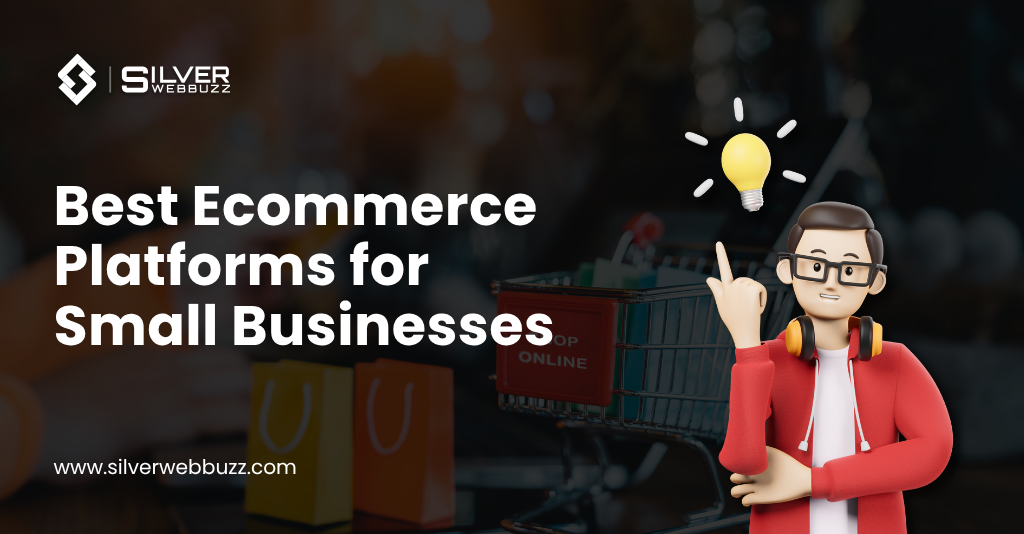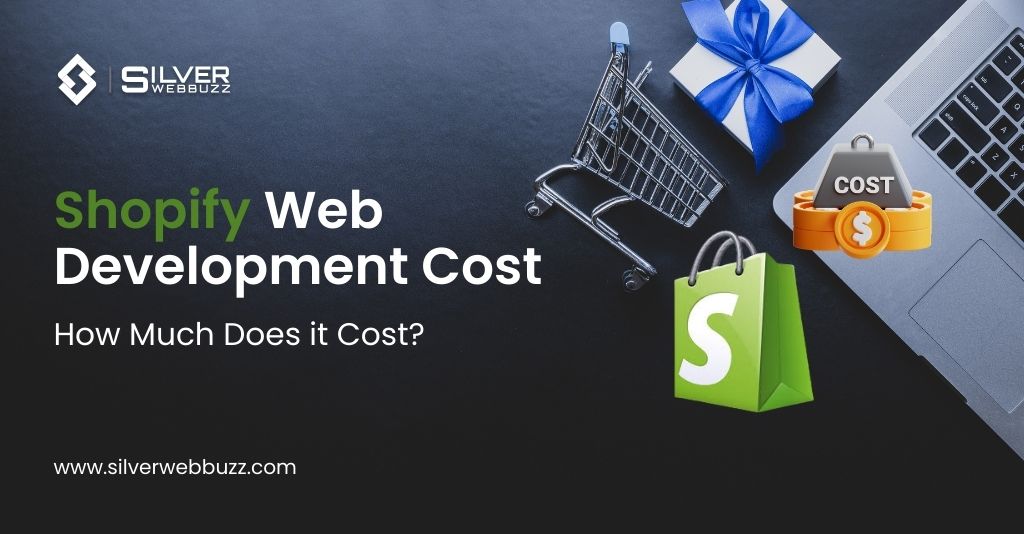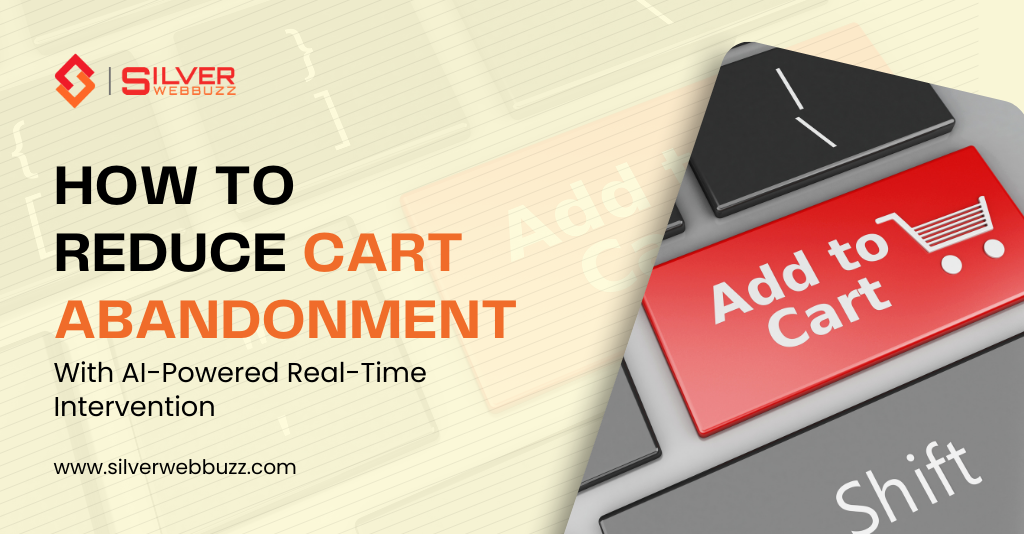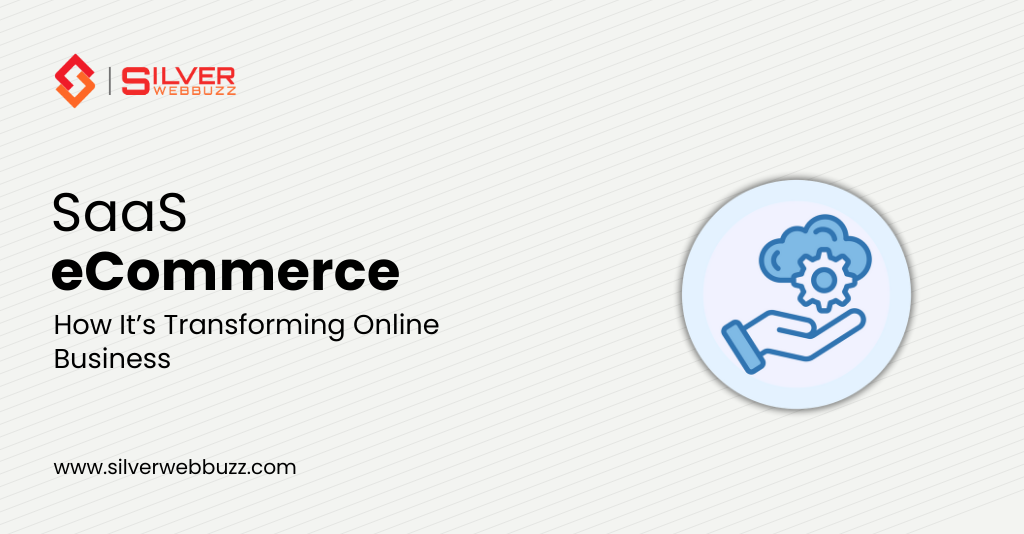The ecommerce industry continues to surge in 2025, fueled by technological innovation, mobile commerce growth, and increasing consumer preference for online shopping. Small businesses are uniquely positioned to benefit from this trend—but only if they choose the best ecommerce platform for small business that fits their needs.
For startups and small brands, selecting the right ecommerce platform isn’t just a tech decision—it’s a strategic move that impacts growth, customer experience, and overall profitability. This guide covers the best ecommerce platforms for small businesses in 2025, provides detailed comparisons, outlines pros and cons, and helps answer the crucial question: “Which ecommerce platform is best for small business?”
Why This Guide Matters: A well-selected ecommerce platform can provide automation, streamline inventory management, simplify checkout processes, and support multi-channel selling. In contrast, a poor choice can slow growth, complicate management, and frustrate customers. That’s why understanding all your options in 2025 is essential.
Top Ecommerce Platforms for Small Businesses in 2025
1. Shopify

Strengths & Weaknesses:
Shopify is widely recognized as the best ecommerce platform for small business in 2025. Its biggest strengths lie in its ease of use, robust app store, built-in payment gateway, and 24/7 customer support. It’s designed for users with little to no technical background, yet powerful enough to handle growing businesses.
Pros:
- Extremely beginner-friendly interface
- 8,000+ apps for enhanced functionality
- Built-in tools for dropshipping, print-on-demand, and POS
Cons:
- Add-ons can increase monthly expenses
- Limited design flexibility without code
Ideal Business Types:
- Small retailers
- Handmade product sellers
- Dropshipping entrepreneurs
- Print-on-demand businesses
- First-time online store owners
What’s New in Shopify 2025:
- Shopify Magic AI: Enhanced with smart customer service automation, predictive inventory management, and campaign insights.
- Loyalty & Subscription Management: Now built-in for recurring revenue.
International Selling Tools: Includes real-time currency conversion and automated tax calculation across countries.
Why Shopify Remains a Leader:
- For small businesses aiming to scale without a steep learning curve, Shopify strikes the perfect balance between usability and power.
- It’s truly the best ecommerce platform for small business looking to grow fast.
2. Wix eCommerce
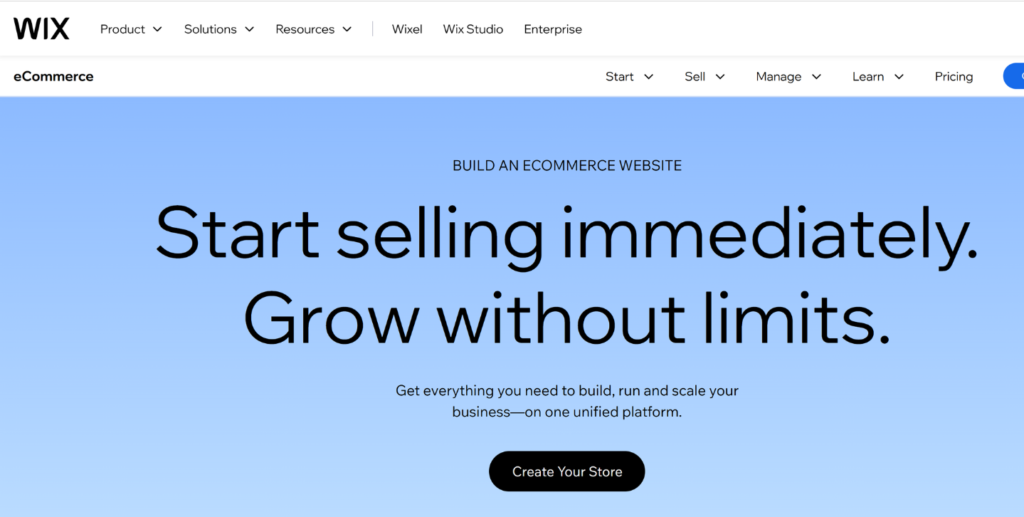
Key Selling Points:
- Wix eCommerce is ideal for small business owners who prioritize design and visual branding.
- It’s perfect for those without coding skills who still want a beautiful online store.
Features Overview:
- Drag-and-drop website builder
- Pre-designed templates tailored to product categories
- Built-in SEO tools
- Social media integration
- Multichannel selling via Facebook, Instagram, and eBay
AI Tools for Product Listings:
Wix has taken its AI offerings to the next level with Wix ADI (Artificial Design Intelligence), which auto-generates optimized product pages, layouts, and even meta descriptions based on user behavior and industry benchmarks.
2025 Innovations:
- Smart Content Generator: Automatically writes engaging product descriptions and blog posts.
- Trend-based Design Suggestions: AI tools now analyze design trends in your niche and suggest layout tweaks accordingly.
- Enhanced Mobile Checkout: Focus on speed and conversion for mobile-first consumers.
Who Should Use Wix:
Small businesses that want to look professional online with minimum effort will find Wix to be the best ecommerce platform for small business that values creativity and ease.
3. Squarespace
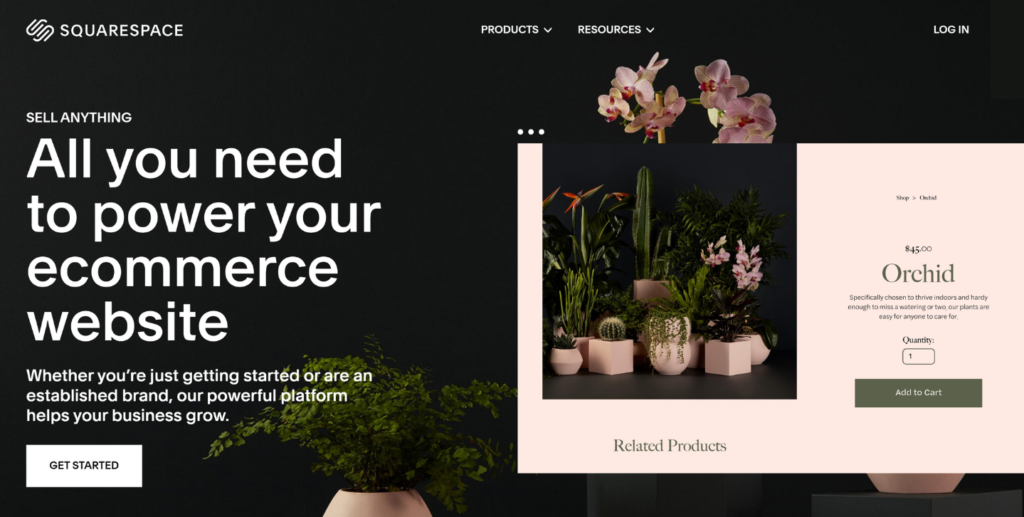
Visual Brand Focus:
Squarespace is the go-to ecommerce solution for artists, designers, and boutique store owners who rely on compelling visuals to sell their products. With some of the best design templates in the market, it’s no wonder creatives flock to this platform.
Best for:
- Photographers
- Fashion designers
- Artists and craftspeople
- Jewelry stores
- Service-based businesses
Mobile-First Tools and Updates:
- Redesigned mobile app now includes real-time inventory management, sales tracking, and marketing campaign management.
- Mobile-optimized checkout with one-click payments.
New Features in 2025:
- Instagram Store Integration: Sync products and sell directly from Instagram posts.
- Video Product Pages: Add video demonstrations that autoplay without slowing down the site.
- Advanced Scheduling: Ideal for booking-based businesses like salons or coaches.
The Squarespace Edge:
If you want your store to stand out visually, and you’re targeting design-conscious buyers, Squarespace might be the best ecommerce platform for small business with a brand-first focus.
4. BigCommerce
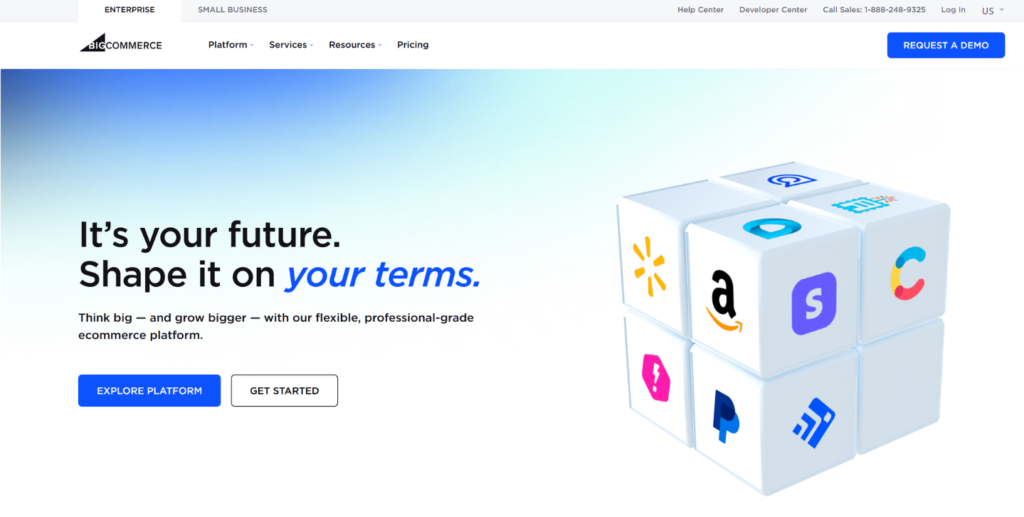
Performance for Growth-Focused Stores:
BigCommerce is built with growth in mind. While it’s not as beginner-friendly as Shopify, it offers unmatched features for businesses planning to scale quickly or enter B2B markets.
Who Should Use BigCommerce:
- Growing brands needing advanced SEO & marketing
- B2B ecommerce businesses
- Multi-channel sellers
Key Feaures:
- Unlimited product listings
- Multi-storefront capabilities
- Flexible APIs
- Real-time shipping quotes
- Built-in tax management
What’s New in 2025:
- AI-driven Customer Segmentation: Helps tailor promotions and ads based on buying behavior.
- Headless Commerce Architecture: Gives full control over frontend customization.
- Real-time Shipping Rate Optimization: Reduce abandoned carts by offering accurate, discounted rates.
Bottom Line:
For ambitious sellers and B2B businesses, BigCommerce is a strong candidate for the best ecommerce platform for small business ready to scale aggressively.
5. WooCommerce (WordPress Plugin)
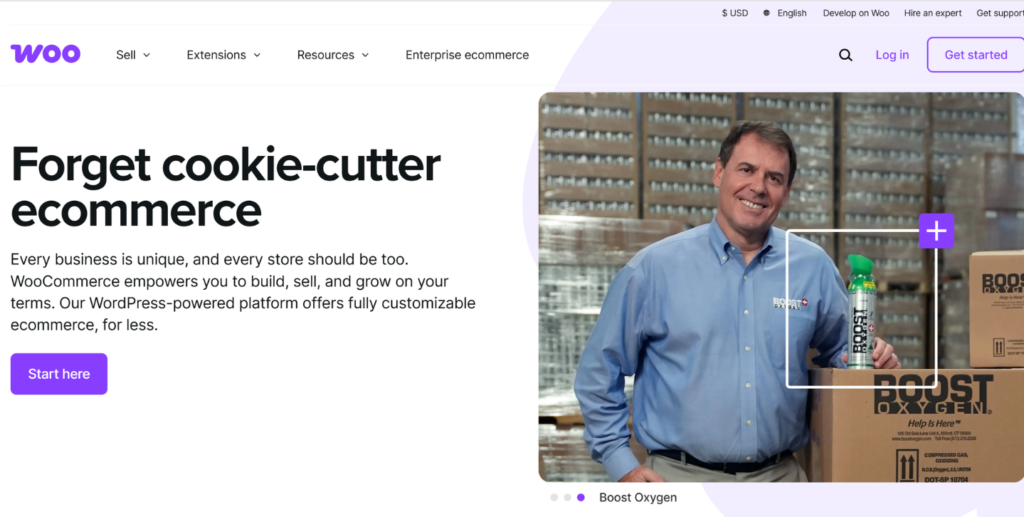
Flexibility for Developers:
- WooCommerce offers total control for those who are already comfortable with WordPress.
- It’s open-source, endlessly customizable, and ideal for content-rich businesses.
Cost Breakdown:
- Free plugin
- Hosting: $5–$25/month
- Premium plugins: $50–$300
- Themes: Free to $100+
- Developer fees: Optional, but common
Pros:
- 100% control over site functionality
- SEO-friendly
- Supports any payment gateway
- No monthly fees (outside of hosting)
Cons:
- Requires maintenance and updates
- Not beginner-friendly
New in 2025:
- AI SEO Assistant: Auto-suggests keywords and content improvements.
- AI Analytics Dashboard: Offers sales predictions, inventory alerts, and ROI insights.
- Content Creation Tools: Uses GPT-like models for product copy, blogs, and emails.
Best For:
Tech-savvy entrepreneurs or those with access to developers will find WooCommerce the best ecommerce platform for small business needing complete flexibility.
6. Square Online
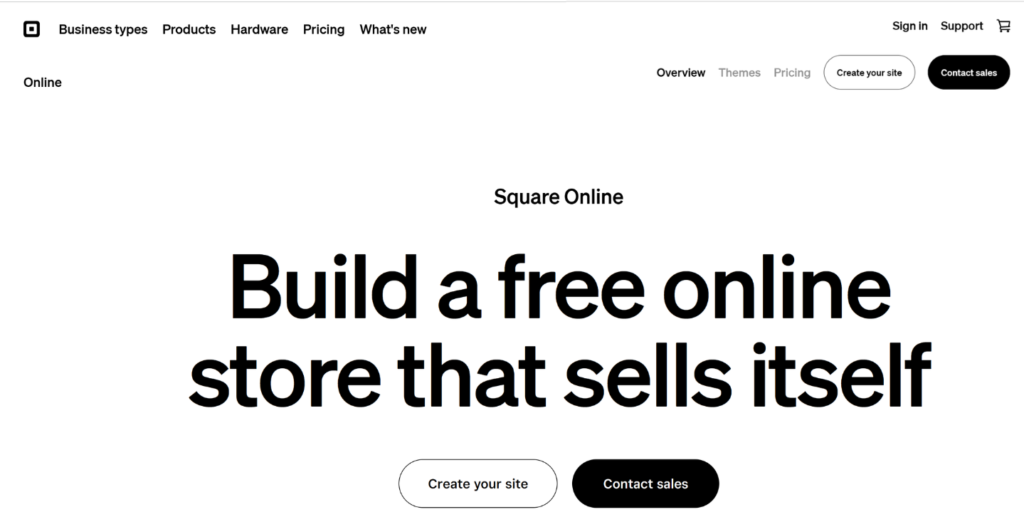
Best for Hybrid Businesses:
- Square Online is ideal for brick-and-mortar businesses expanding into ecommerce.
- Its seamless integration with Square POS makes inventory, sales, and customer data management effortless.
Business Types:
- Restaurants and cafés
- Beauty salons and spas
- Local service providers
- Pop-up shops
Features:
- Automatic inventory sync with in-store POS
- Local delivery options
- Built-in tipping tools
- Loyalty rewards and scheduling tools
What’s New in 2025:
- Same-Day Delivery: Through local courier integrations.
- Smart Loyalty System: Reward customers based on spend history.
- Appointment Integration: Ideal for services like haircuts, yoga, or repairs.
Verdict:
For physical store owners, Square Online is arguably the best ecommerce platform for small business operating both online and offline.
7. Ecwid by Lightspeed
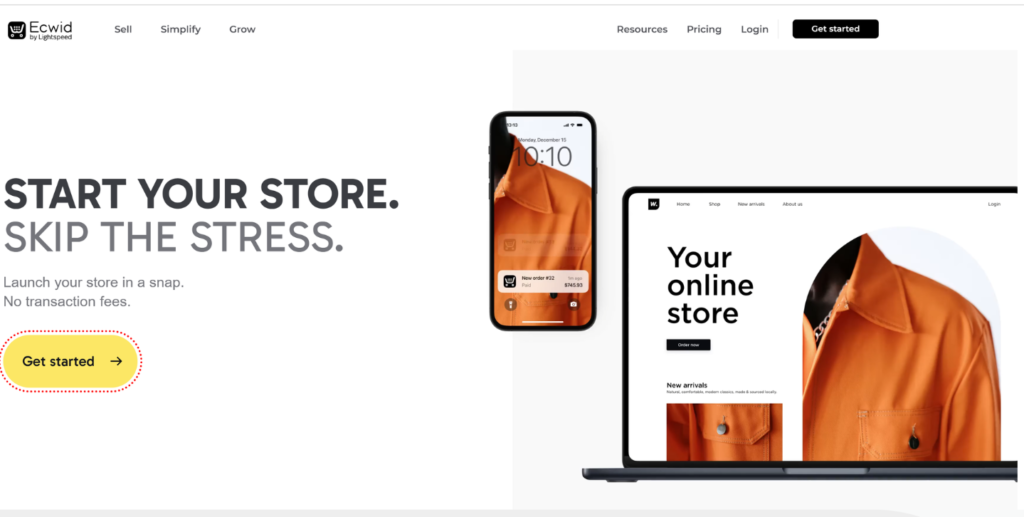
Plug-and-Play Simplicity:
Ecwid is perfect for small business owners who already have a website and want to start selling without rebuilding everything from scratch.
Key Features:
- Add ecommerce to any existing website
- Multi-language and multi-currency support
- Facebook Shop and Instagram integration
- Real-time shipping rates
2025 Upgrades:
- AI Inventory Management: Automatically alerts on low stock and predicts reorder needs.
- One-Click Social Store Creation: Instantly build stores on Facebook and Instagram.
- Smart Shipping Optimizer: Dynamically selects the cheapest, fastest shipping options.
Why Choose Ecwid:
It’s the best ecommerce platform for small business owners looking to enhance their current site rather than replace it.
8. Adobe Commerce (Magento)
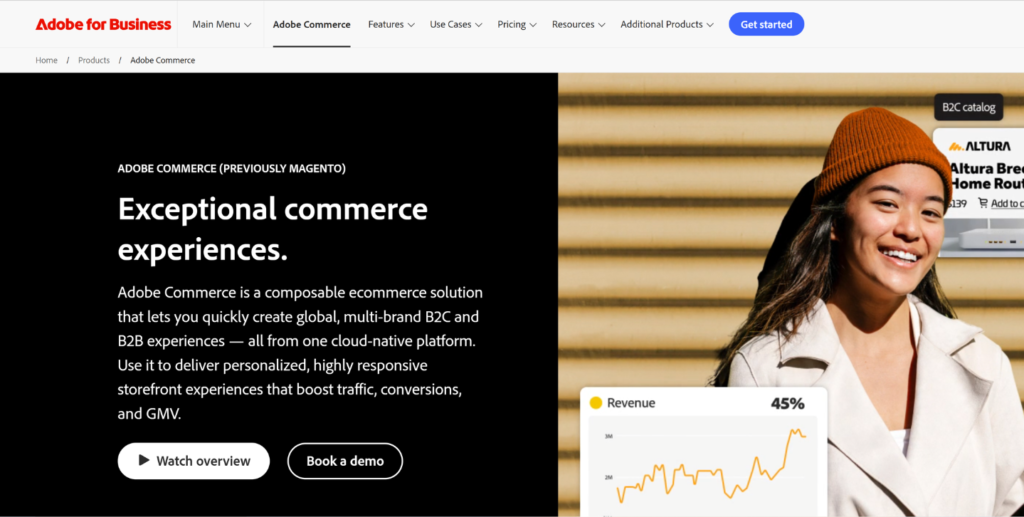
Not Ideal for Beginners:
Adobe Commerce (formerly Magento) is a robust platform for large-scale operations. While it offers unmatched customization and performance, it’s too complex and costly for many small businesses just starting out.
Use Case:
- Mid-sized to enterprise-level ecommerce
- High-volume retailers
- Custom feature-heavy websites
2025 Highlights:
- Predictive Merchandising AI: Automatically reorders and promotes high-performing products.
- Cloud Infrastructure: Enhanced performance and scalability.
- Advanced B2B Workflows: Custom quoting, bulk ordering, and credit limits.
Why It’s on the List:
For small businesses planning to scale into an enterprise, Adobe Commerce can be considered a future-proof investment, though it’s not the best ecommerce platform for small business in early stages.
How to Choose the Best Ecommerce Platform
When asking yourself how to choose the best ecommerce platform, consider the following factors:
Business Size & Budget
Your platform choice should match both your current budget and your business growth plans. If you’re a startup or small retailer, avoid going for high-end enterprise solutions right away. The best ecommerce platform for small business offers affordable monthly plans with essential features to help you scale gradually.
Inventory Type & Size
Some small businesses sell just a few items, while others manage hundreds of SKUs. If you have a simple product catalog, entry-level platforms will do. But for larger inventories with variants or bundles, choose a platform that offers bulk uploads, product tagging, and inventory tracking. Flexibility is key to smooth management.
Customization & Design Options
Design matters—especially if your brand is focused on aesthetics. Look for a platform that offers beautiful, customizable templates and easy styling options. For advanced users, code access allows for deeper branding. The best ecommerce platform for small business should let you reflect your brand identity without needing a developer.
Ease of Use & Technical Skills
If you’re not a tech expert, prioritize ease of use. Platforms like Shopify or Wix offer drag-and-drop interfaces that simplify setup and management. On the other hand, if you’re comfortable with coding or hiring developers, open-source platforms like WooCommerce offer more control and flexibility for customization.
Scalability & Growth Features
Think long-term—your platform should grow with you. Features like multi-store management, multi-currency support, and seamless app integrations will be crucial as your business expands. The best ecommerce platform for small business should support growth without requiring a costly migration later.
Payment Gateway & Transaction Fees
Payment processing affects your profits. Choose a platform that supports multiple gateways and offers transparent transaction fees. Some platforms charge extra per sale or limit certain gateways unless you upgrade. Always review the fine print to ensure you’re not losing out as your sales increase.
SEO & Marketing Tools
Organic traffic is vital, especially when you’re starting out. Your platform should support SEO basics like clean URLs, meta tags, and blog integration. Built-in marketing tools—like email campaigns or social media integration—can save you time and money. The best ecommerce platform for small business should help drive both visibility and engagement.
Support & Customer Service
Reliable support can make or break your experience. Look for 24/7 live chat, phone support, and comprehensive help centers. If you run into issues, quick assistance matters. Platforms with strong user communities or detailed documentation also make learning easier as your store grows.
Which Platform is Best for You?
Need SEO power and blogging tools? Choose WooCommerce
WooCommerce is perfect for businesses focused on content marketing and SEO. Built on WordPress, it offers strong blogging features and SEO plugins. Great for content-driven or niche brands.
Want the fastest setup without coding? Go for Wix or Square Online
Wix and Square Online offer simple drag-and-drop builders for a quick, code-free setup. Wix is ideal for design-focused users, while Square Online suits in-person businesses going digital.
Expecting rapid growth? Shopify and BigCommerce are built for scale
If you plan to grow fast, Shopify and BigCommerce provide powerful tools. They support multi-channel sales, advanced inventory, and international expansion with ease.
Prioritize aesthetics? Choose Squarespace
Squarespace is best for brands that rely on visuals like artists, boutiques, or designers. It offers elegant templates and mobile-optimized designs with minimal effort.
Expert Tips for Launching Your Small Business Ecommerce Store
Mobile Optimization
Choose the best ecommerce platform for small business that supports mobile-first design. Use responsive themes and consider AMP for faster mobile load times. A mobile-optimized store ensures better engagement and conversions on smartphones.
Product Photography & Descriptions
Avoid stock images—use original, high-quality photos that reflect your brand style. Write clear, engaging product names and descriptions. Visual storytelling helps your store stand out on the best ecommerce platform for small business.
Integrating Marketing Tools
Start strong by connecting CRM tools and setting up email marketing with customer segmentation. Many of the best ecommerce platforms for small business now offer built-in AI insights to help you personalize and automate campaigns.
Optimizing for SEO and Speed
Improve visibility by using schema markup and clean URLs. Speed up your store with image compression and caching tools. A fast, SEO-ready site is crucial when using any best ecommerce platform for small business.
Inventory Management Essentials
Use tools like Orderhive or Zoho Inventory to sync your product data across marketplaces. The best ecommerce platform for small business should support easy integration with inventory tools to reduce errors and stock issues.
Conclusion
Choosing the best ecommerce platform for small business in 2025 depends on your specific needs, budget, and future growth plans. While Shopify and BigCommerce stand out for scalability, Wix and Squarespace shine for simplicity and design.
For tech-savvy business owners, WooCommerce provides unmatched flexibility. And for hybrid online-offline models, Square Online is unbeatable. As you navigate the selection process, Silver WebBuzz recommends evaluating trial versions, comparing feature sets, and planning long-term scalability.
To maximize your store’s potential, consider professional e-commerce development services that align with your goals and platform of choice. Start your ecommerce journey today—choose the right platform and turn your small business into an online success story.
